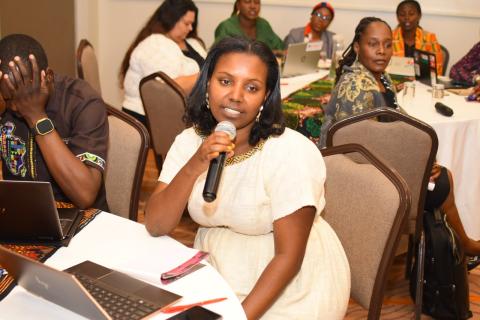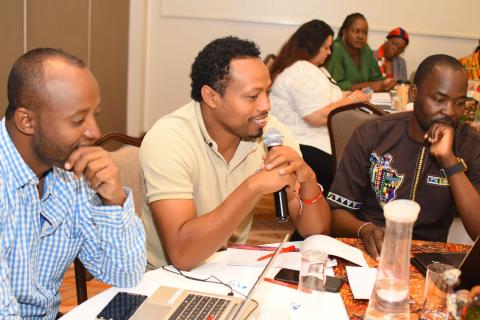What does a just transition mean for Africa?
What does a just transition mean for Africa?
The concept of a just transition is not new and has been around since the 1980s when it was used by Trade Unions to draw attention to the social effects of environmental measures (United Nations, 2023). In the context of climate change, it aims to ensure that no one is left behind, or excluded, in the transition to environmentally sustainable and low-carbon economies. As an approach, it was highlighted in 2015 during COP21 through its inclusion in the Paris Agreement, which refers to “the imperatives of a just transition of the workforce and the creation of decent work and quality jobs in accordance with nationally defined development priorities” (United Nations, 2015).
In 2022, as part of the COP27 decision, a work programme was established on the implementation of just transition pathways. Two years later, a report, African perspectives of a just transition to low-carbon economies, showed how low-carbon and climate resilient development pathways for Africa need to recognise the importance of avoided emissions rather than mitigation. It also showed the importance of ensuring that the impacts of climate change do not erode development gains or the dignity of its people. The current carbon markets are not supportive of Africa’s long-term sustainability as they encourage wealthier countries to continue polluting while the responsibility of environmental clean-up falls onto African nations. Overall, a just transition for Africa means, at a minimum, developed countries deliver on their obligations, there is shared prosperity, and African countries are present at decision-making processes that affect their development.
Since 2019, the CDKN Ethiopia programme has worked with relevant government institutions and development partners to build capacity and facilitate cross-sectoral learning on the integration of gender equality and social inclusion (GESI) in climate action. These are being done through a national GESI and climate change community of practice (CoP) that was established and is funded through CDKN and other partners.
As part of this engagement, four representatives of the CoP from various ministries joined an in-person dialogue organised by Akina Mama wa Afrika (AMwA), Framing Africa’s Just Transition: From Extractive to Regenerative Economic and Climate Action Models. Held in Nairobi, Kenya in October 2024, it brought together civic actors, political leaders, government technocrats, women’s rights activists, economic justice advocates, climate justice leaders and academics from diverse sectors and institutions to share their input, learn about different initiatives and initiate discussion with potential partners.

The AMwA dialogue emphasised the need to evaluate and reimagine development strategies across the continent to ensure climate change actions lead to equitable outcomes. It was agreed that this process needs to put human wellbeing, sustainability and equity front and centre. Accordingly, transformation needs to be seen in the systems and structures that have created and sustained economic inequalities for Africa’s most marginalised people. There is rationale for urgent and concerted action towards a just transition at all levels, from that which is personal, such as care work, to that which is very high level, such as gaps in funding received. This includes:
-
Despite contributing less than 4% of total global GHG emissions, due to the disproportionate effect of climate change, African countries are pushed to divert up to 9% of their budget to respond to climate extremes. This has contributed to a regression in various sustainable development targets, including gender, poverty and hunger.
-
Although African countries are significantly affected by climate change, with nine out of ten most climate-affected countries being in Africa, they receive only about 3% of the global climate finance. Unless adaptation and mitigation efforts are adequately put in place, the continent could lose up to 5% of its GDP by 2040. With a climate finance gap of $2.5 trillion, African nations are left with limited resources to implement national climate action plans.
-
To successfully demonstrate the benefits of a just transition, Gross Domestic Product (GDP) needs to be accompanied by other economic assessment tools that take into consideration a multitude of factors that GDP does not account for. GDP focuses on short term economic gains over long term losses including impacts on climate and social wellbeing that would help to capture how just the transition is. For example, GDP does not give value for unpaid or underpaid care work, which sustains economies and communities.
-
African countries are disproportionately allocating resources for debt repayment, and as a result, social services that are key for a just transition, such as health, education and the care economy, are heavily underfunded. For example, the gendered nature of care work in Africa places a burden and time poverty on women, which is added to when the care economy is underfunded.
-
Underpaid labour in different sectors, including household care work, healthcare and childcare, need to be captured in economic valuations.

To ensure a just transition, the AMwA dialogue proposed the following alternative actions.
Consider:
-
Establishing a system that puts people over profit to ensure inclusivity at the same time as transitioning to a low carbon economy. This includes the provision of essential public goods and services such as social protection systems that safeguard the most vulnerable members of society at the same time as transitioning to a low carbon economy.
-
Promoting the education of communities about their rights. This is important so that they can participate in shaping economic policies and ably demand transparency and accountability from their governments. Tax and fiscal systems need reforming to promote social justice and reduce the burden on low-income households.
-
Restructuring power dynamics, and reclaiming control over land, seeds and food systems. The voices of African women and small-scale farmers who have invaluable traditional knowledge and practices and promote communal practices need to come to the forefront to build sustainable agriculture and food sovereignty.
-
Shifting away from the current market-based solution of a carbon market to direct, equitable financing mechanisms that centre the needs and voices of affected communities. There is significant market disparity where carbon trades cheaply in Africa compared to Europe where prices are much higher.
-
Introducing new and additional finance for climate action to ensure funds are sufficient and reach those who are most vulnerable. The focus should be on securing public, grant-based climate finance. This financing must be rooted in principles of justice, equity and human rights, addressing both adaptation and mitigation needs in a way that empowers communities rather than perpetuating existing power imbalances.
The event concluded with a call for African states to unite across borders and constituencies to build a shared vision for a just transition that is rooted in equity and sustainability. It was agreed that dialogues like this, are of paramount importance if African countries are to be independent and craft their own development path. Solidarity will be cultivated through discussion, experience sharing and building trust between communities. The outcome of this discussion should reach wider circles in the continent. Strong alliances within and between different countries can then influence policy makers of each country and ensure a just transition is central to climate change actions. Change starts when the policy makers understand the challenges on the ground, the truth behind the negotiations they conduct on behalf of their people and the impact they can create.
You may access the full report of the dialogue here.
